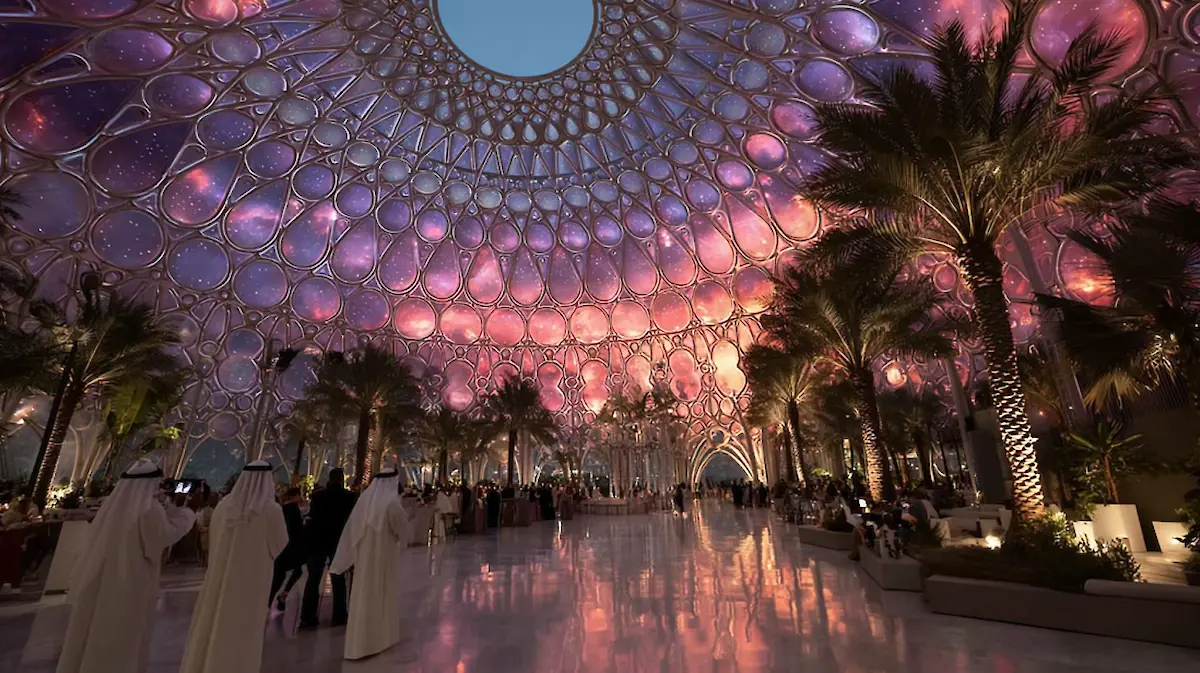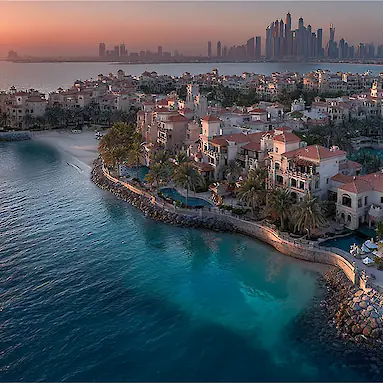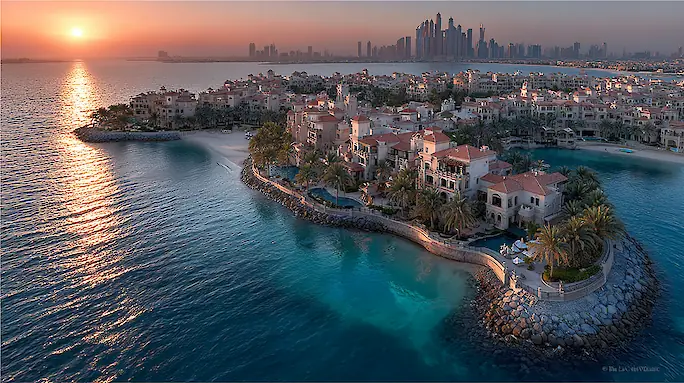The booming sound of a cannon blast echoes through the warm evening air, and in an instant, Dubai shifts its rhythm. The peaceful daytime silence gives way to the buzz of lively streets, the aroma of spices, and joyful voices. This is the signal for iftar—the evening meal that transforms the entire metropolis into one giant, welcoming home. This guide is your backstage pass to Ramadan in Dubai. We won’t just tell you about it; we’ll take you by the hand, from luxurious starlit iftars to the nuances of etiquette that will help you feel not like a tourist, but like a cherished guest.
More than just fasting: why Ramadan is the best time to visit?: In Dubai, the holy month isn’t a period of restrictions, but a time of unique events, generous offers, and special hospitality. The city invites everyone, regardless of faith, to become part of this amazing celebration of culture and spirituality.
The rhythm of Ramadan: How Dubai changes and what it means for you

To truly understand Ramadan in Dubai, you need to feel its unique rhythm. The city lives according to two distinct scenarios: a calm daytime and a vibrant nighttime. Here are the key traditions and their practical implications for your trip.
- Daytime Lull (Saum): Imagine a metropolis plunging into meditation for a few hours. The streets become more spacious, shopping malls exude a pleasant coolness and quiet, and you can snap photos at major landmarks without hundreds of people in the background. For tourists, this is a rare opportunity to experience Dubai without the hustle and bustle.
- Evening "Explosion" (Iftar): But as soon as the cannon fires, the city seems to hit the "play" button. The streets fill with a buzz of voices, every café wafts with aromas of grilling and spices, and shop windows sparkle with thousands of lights. This isn't just "city energy"—it's a true carnival of life that's impossible not to fall in love with.
- An Atmosphere of Hospitality (Generosity and Togetherness): Ramadan is a time of compassion and strengthening bonds. You'll feel like a welcome guest, experiencing the famed Arab hospitality that shines especially brightly during this month.
Must-see highlights: Key events of Ramadan 2026
Evening Dubai during Ramadan is no time for sleep. The city offers so many events that the main challenge becomes choosing which ones to attend. Here are just a few key attractions you won't want to miss in 2026.
Plan ahead, but stay flexible: The exact schedule of events for 2026 will be released a few weeks before Ramadan begins (expected dates: February 18 – March 19). Keep an eye on announcements on the official Visit Dubai portal, but remember that dates may shift slightly depending on the lunar calendar.
Hai Ramadan festival at Expo City Dubai

The main event of the month unfolds at the futuristic venue of Expo City. Imagine standing beneath the giant dome of Al Wasl, shimmering with thousands of lights, telling ancient stories through light. All around you stretches a bustling oriental market, fragrant with cardamom and leather, where artisans create their masterpieces right before your eyes. From somewhere nearby comes the melodic sound of the oud, and the air is filled with aromas of street food from around the world—ranging from Emirati flatbreads to Asian noodles. This isn't just a festival—it's a gateway into a living Arabian fairy tale.
Culinary discoveries: Iftars and Suhoors

If travel for you is primarily about taste, then Ramadan in Dubai will become your personal gastronomic paradise. It's during iftar (the evening breaking of the fast) and suhoor (the pre-dawn meal) that the city reveals its greatest culinary secrets. Dubai offers options to suit every taste and budget.
- Luxury Tents: This is the epitome of Ramadan chic. Imagine a huge, lavishly decorated tent with soft carpets and the dim glow of lanterns. Here, iftar is a full-blown spectacle: endless buffet lines groan under the weight of oysters and roasted lamb, chefs prepare sizzling saj and shawarma right before your eyes at live cooking stations, and the air is filled with the aroma of hookah and the sounds of live Arabic music. Prices start from 250 AED.
- Buffet Restaurants: This is the most popular format for a family iftar. Dozens of hot dishes, mountains of fresh salads like tabbouleh and fattoush, juicy grilled meats, fragrant soups, and, of course, an entire table dedicated solely to oriental sweets—from baklava to umm ali. The atmosphere here is more democratic, lively, and fun, perfect for trying everything all at once. Prices range from 100 to 250 AED.
- Authentic Cafés: Hidden within the maze-like streets of Deira and Bur Dubai’s old districts are true gems. In small family-run establishments, you’ll be offered a traditional iftar set: hearty lentil soup, creamy hummus, the day’s main dish (such as chicken biryani), and, of course, dates with water. This isn’t about luxury; it’s about warmth, the genuine taste of home-cooked food, and the chance to feel like a local. Prices up to 100 AED.
Gourmet tip: Be sure to try traditional Emirati dishes for Ramadan: haris (a tender wheat porridge with meat) and margoga (a flavorful stew of meat and vegetables). And don't forget to start your iftar like the locals—with a date and a glass of water.
Night markets and festivals
As the daytime heat subsides, the city comes alive. Night markets and fairs open in various parts of Dubai, staying open late into the night.
- Ramadan district: This stylish fair, usually located in a prestigious area like DIFC, attracts young people and design enthusiasts. Here you can find unique gifts from local brands, designer clothing, artisanal perfumes, and sample exquisite street food.
- Global village: Although this fair operates throughout the winter season, it takes on a special charm during Ramadan. Pavilions from different countries offer themed souvenirs and dishes, and the evening program becomes even richer, filled with the spirit of celebration and cultural unity.
A Ramadan guide: Planning your trip
To ensure your trip goes perfectly, it's important to be aware of a few practical details. Dubai during Ramadan is a welcoming and comfortable city, but respecting local traditions will make your stay even more enjoyable.
Etiquette and dress code: how to show respect
To feel confident and comfortable in Dubai during Ramadan, it's enough to keep a few simple points in mind. These aren't strict prohibitions, but rather gestures of respect that locals will surely appreciate, responding to you with even greater hospitality.
| What to do | What to avoid |
|---|---|
| Dress modestly. Choose clothing that covers your shoulders and knees, especially when visiting malls and public places. | Eating, drinking, and smoking in public during daylight hours. This also applies to chewing gum. |
| Greet the locals. The phrase "Ramadan Kareem" ("Generous Ramadan") will be met with a warm smile. | Playing music loudly or behaving noisily in public places during daylight hours. |
| Be patient. The pace of life slows down, especially before iftar. Approach this with understanding. | Photographing people without their permission, especially women or during prayer. |
Transportation and getting around the city
Dubai's transportation system is perfectly adapted to the special Ramadan schedule.
- Metro: Operating hours are extended until midnight on weekdays and until 1:00 a.m. on Fridays, which is very convenient for evening outings.
- Taxis: Easily available, but be prepared for increased demand and traffic congestion just before iftar.
- Parking: In the evening, it can be difficult to find a spot near popular malls and restaurants. Use the metro to travel to Downtown and Expo City to avoid parking difficulties.
Is it worth visiting Dubai during Ramadan?
To sum up: traveling to Dubai during Ramadan is a unique experience that differs significantly from visiting at any other time of the year.
- Key advantages: Deep cultural immersion, incredible gastronomic experiences, a festive atmosphere in the evenings, and a high level of safety and organization.
- Potential drawbacks: Restrictions on food and drink in public areas during the day, a more relaxed pace of life, and high air temperatures in March.
- This is your perfect choice if you:
- Culture enthusiast: Want to experience Arab traditions in a safe and modern setting.
- Foodie: Dream of diving into a gastronomic marathon of Middle Eastern cuisine.
- Family with children: Looking for a safe destination rich in evening entertainment.
- You might want to consider another time if you: Are seeking exclusively beach relaxation with cocktails or lively club parties, as nightlife during this period tends to be more subdued and culturally focused.
Ultimately, Ramadan in Dubai offers a chance to see how the megacity of the future sheds its business-oriented facade and reveals itself as warm, heartfelt, and incredibly welcoming. And that’s a sight definitely worth traveling for.























Comments